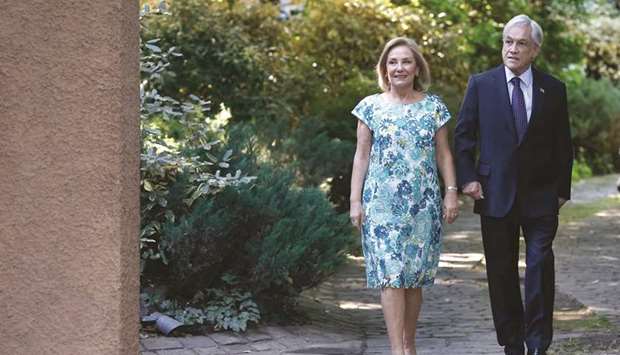Chile’s political landscape once again swung back from left to right, after billionaire businessman Sebastian Pinera beat an independent backed by outgoing centre-leftist President Michelle Bachelet.
The latest swing of the political pendulum came as Pinera, who ran the South American copper giant from 2010-14, beat Alejandro Guillier, a 64-year-old TV presenter turned senator who ran as an independent backed by Bachelet. Bachelet and Pinera had tag-teamed the presidency since she first took office in 2006, but the constitution prohibited her from seeking a third term.
Pinera, 68, won 54% of the vote in Sunday’s run-off, a resounding win after a shaky performance in the first round of voting in November.
“We have suffered a tough defeat,” Guillier said after conceding.
He had called for the anti-Pinera opposition to unite after the first round and defend reforms launched by Bachelet, a centre-left leader.
Guillier failed, however, to rally far-left supporters who had voted for journalist Beatriz Sanchez in the first round, when she won 20% of the vote to his 22%.
Pinera meanwhile managed to woo an additional 1.4mn voters after his lacklustre 37% in the first round, as Chileans appeared to have seen him as a safe pair of hands at a time when GDP growth has been sluggish in comparison with previous years.
“Pinera’s triumph by the margin he achieved was surprising,” said political analyst Guillermo Holzmann.
Pinera, whose next four-year term will begin in March 2018, had breakfast yesterday with Bachelet at his house, in line with the country’s political tradition.
“For voters, this wasn’t an ideological choice between right and left,” said Holzmann. “It was a pragmatic vote. They voted for whoever gave them the greatest sense of certainty.”
Pinera managed to win 13 out of the country’s 15 regions, including Antofagasta, where Guillier serves as senator. He succeeded in capturing the votes of those fearful of a swing further to the left, comparing Guillier to Venezuela’s Socialist leader Nicolas Maduro.
Riding a wave of elections in recent years that have seen leftists ousted in Argentina, Brazil and Peru, Pinera also tapped into a deeply conservative tranche of Chilean society upset at Bachelet’s support for same-sex marriage and abortion. At the same time, he performed a U-turn by promising to maintain Bachelet’s policy of free university education, despite having earlier declared “free things mean less commitment.”
“I am going to be a unity president, a president for all Chileans and a president for work...for progress, and of course for the middle class and all the regions of our country,” a joyful Pinera told a victory rally in central Santiago.
“Chile is saved, Chile is saved!”, chanted a thousand or so supporters who had gathered to celebrate the second victory of the business magnate, whose wealth is estimated at around $2.7bn.
“It was the best thing that could happen to us,” said 43-year-old security guard Mauricio Vega. “We lived better under Pinera and now we will return to a better life, and have work.”
That confidence was reflected in Chile’s ISPA stock market, which opened yesterday 6.2% higher and within minutes had gained 7.55%, nudging the 5,600 mark.
Pinera has outlined an ambitious programme that includes adding Chile to the list of developed countries by the year 2025, creating 700,000 jobs and stabilising the public debt, which is currently at 23.8% of GDP.
He has also vowed to lower the corporate tax rate from 27% to 25% and reform the pension system.
That optimism was counterbalanced by concerns among opposition supporters over the future of Bachelet’s social reforms.
“I’m furious and worried. Those who were supposed to vote didn’t,” said Maria Salome, a 71-year-old street vendor. “I’m really angry because they are getting what they want, and the right wants a people with no education so it is easier for them to do whatever they want with us.” But the make-up of the new Congress means that Pinera will need to cut deals with the new opposition. His coalition has 55 seats in the 155-member Chamber of Deputies.
The left is split into two factions — the Broad Front, a far-left grouping, has 20 seats, while the New Majority has 43. “We have to be more critical of ourselves. We have suffered a tough defeat,” said Guillier.”And there are more lessons to be learned in a defeat — we have to lift our spirits and get out there and defend the reforms that we believe in.”

Chilean president-elect Sebastian Pinera walks with his wife Cecilia Morel to a press conference in Santiago.
